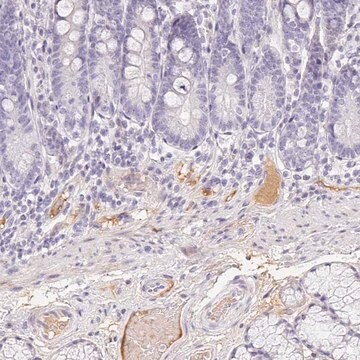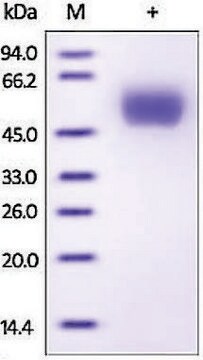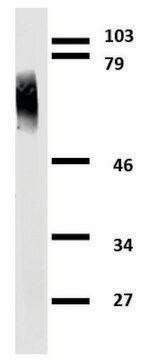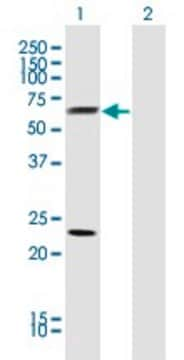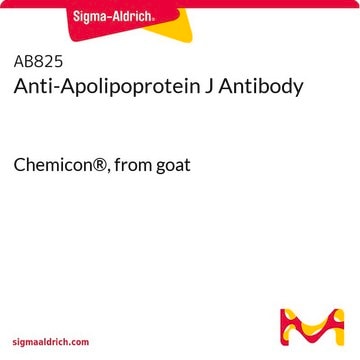추천 제품
생물학적 소스
rabbit
결합
unconjugated
항체 형태
affinity isolated antibody
항체 생산 유형
primary antibodies
클론
polyclonal
형태
buffered aqueous solution
종 반응성
human, mouse
기술
immunofluorescence: suitable
immunohistochemistry: suitable
indirect ELISA: suitable
western blot: suitable
NCBI 수납 번호
UniProt 수납 번호
배송 상태
dry ice
저장 온도
−20°C
타겟 번역 후 변형
unmodified
유전자 정보
human ... CLU(1191)
관련 카테고리
일반 설명
The Clusterin (CLU) gene is mapped to human chromosome 8p21.1. The encoded protein is a chaperone and is conserved along with evolution. It is present in human tissues and fluids.
면역원
Clusterin antibody was raised recombinant human Clusterin isoform 1.
애플리케이션
Anti-Clusterin antibody produced in rabbit has been used in immunohistochemical (IHC) staining (1:1,000 & 1:100).
생화학적/생리학적 작용
Clusterin (CLU) is a multifunctional plasma protein and a fluid-phase complement inhibitor. It mediates the complement terminal pathway. Clusterin is an ATP-independent small heat shock protein-like chaperone. It functions as a redox sensor and a lipid transporter. Clusterin is associated with many age-related diseases such as neurodegeneration and metabolic syndrome. It is involved in cancer progression, promotion, metastasis, and chemoresistance. Increased serum CLU levels are observed in type 2 diabetes (T2D). It is known to suppress proteotoxicity. Clusterin might show anti or proapoptotic activities. This protein is associated with different functions of the brain. A single nucleotide polymorphism (SNP) in the CLU gene might cause the development of late-onset Alzheimer′s disease (LOAD).
특징 및 장점
Evaluate our antibodies with complete peace of mind. If the antibody does not perform in your application, we will issue a full credit or replacement antibody. Learn more.
물리적 형태
Supplied in PBS with 0.02% sodium azide.
면책조항
Unless otherwise stated in our catalog or other company documentation accompanying the product(s), our products are intended for research use only and are not to be used for any other purpose, which includes but is not limited to, unauthorized commercial uses, in vitro diagnostic uses, ex vivo or in vivo therapeutic uses or any type of consumption or application to humans or animals.
Not finding the right product?
Try our 제품 선택기 도구.
Storage Class Code
10 - Combustible liquids
WGK
WGK 2
Flash Point (°F)
Not applicable
Flash Point (°C)
Not applicable
시험 성적서(COA)
제품의 로트/배치 번호를 입력하여 시험 성적서(COA)을 검색하십시오. 로트 및 배치 번호는 제품 라벨에 있는 ‘로트’ 또는 ‘배치’라는 용어 뒤에서 찾을 수 있습니다.
Prakash Priyadarshi Praharaj et al.
Biochimica et biophysica acta. Reviews on cancer, 1875(2), 188500-188500 (2021-01-02)
Clusterin (CLU) is an evolutionary conserved molecular chaperone present in different human tissues and fluids and established to be a significant cancer regulator. It controls several cancer-associated cellular events, including cancer cell proliferation, stemness, survival, metastasis, epithelial-mesenchymal transition, therapy resistance
Katina M Athanas et al.
Schizophrenia research, 169(1-3), 381-385 (2015-10-21)
The expression of the gene that encodes clusterin, a glycoprotein that has been implicated in the regulation of many cellular processes, has previously been found in gene expression profiling studies to be among the most significantly differentially expressed genes in
Sarah M Carpanini et al.
Genes, 12(3) (2021-04-04)
Late-onset Alzheimer's disease (LOAD), the most common cause of dementia, and a huge global health challenge, is a neurodegenerative disease of uncertain aetiology. To deliver effective diagnostics and therapeutics, understanding the molecular basis of the disease is essential. Contemporary large
Vladimir J Balcar et al.
Neurochemical research, 46(2), 411-422 (2020-11-19)
Clusterin (CLU; also known as apolipoprotein J, ApoJ) is a protein of inconstant structure known to be involved in diverse processes inside and outside of brain cells. CLU can act as a protein chaperon or protein solubilizer, lipid transporter as
Ahmed A Moustafa et al.
Reviews in the neurosciences, 29(1), 21-38 (2017-09-28)
In this review, we discuss the genetic etiologies of Alzheimer's disease (AD). Furthermore, we review genetic links to protein signaling pathways as novel pharmacological targets to treat AD. Moreover, we also discuss the clumps of AD-m ediated genes according to
자사의 과학자팀은 생명 과학, 재료 과학, 화학 합성, 크로마토그래피, 분석 및 기타 많은 영역을 포함한 모든 과학 분야에 경험이 있습니다..
고객지원팀으로 연락바랍니다.

